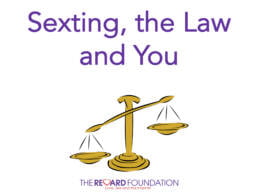Lesson Plans: Sexting
A unique feature of The Reward Foundation lessons is the focus on the workings of the adolescent brain. This best helps pupils understand and build resilience to potential harms from sexting and pornography use.
Our lessons comply with the latest Department of Education’s (UK government) “Relationships Education, Relationships and Sex Education (RSE) and Health Education” statutory guidance. The Scottish Editions align with the Curriculum for Excellence.
They can be used as stand-alone lessons or in a set of three. Each lesson has a set of PowerPoint slides plus a Teacher’s Guide and, where appropriate, packs and workbook. The lessons come with embedded videos, hotlinks to key research and other resources for further enquiry to make the units accessible, practical and as self-contained as possible.
If you have any difficulty downloading a lesson from our site, please go to the TES.com site where the lessons are also available.
- Introduction to Sexting
- Sexting, the Law and You**
** Available for pupils in England and Wales based on the laws of England and Wales; also available for pupils in Scotland based on Scots law.
Lesson 1: Introduction to Sexting
What is sexting, or youth-produced sexual imagery? Pupils consider why people might ask for and send nude selfies. They compare the risks of sexting to consensual sex. The lesson also looks at how pornography use affects sexting and sexual harassment.
It offers information about how to protect themselves from unwanted harassment and where to find online, youth-focused resources to learn more.
Pupils learn about how to have sexual images of them removed from the internet.
We’d love your feedback so that we can improve the lessons.
If you have any difficulty downloading a lesson from our site, please go to the TES.com site where the lessons are also available.
If the lessons are useful to you, feel free to make a donation to our charity. See the DONATE button in the footer below.
Lesson 2: Sexting, the Law, and You
Sexting is not a legal term but has very real legal consequences. It is illegal for children to make, send and receive indecent images of children, even with consent. The police regard it as a safeguarding issue. If a young person is reported to the police for sexting offences, it can affect later job prospects, even volunteering, if it involves work with vulnerable people.
We provide two lesson plans here (for the price of one), one for the lower school and one for the upper school. They each have different case studies to reflect changing stages of maturity. The case studies are based on real live legal cases and reflect common situations that pupils may find themselves in.
The Case Studies Pack for Teachers provides a range of answers and suggestions to help pupils think through and discuss these tricky situations found in the Case Studies Pack for Pupils. They allow pupils to discuss matters in a safe space and help build resilience for use outside the classroom.
Pupils learn about how to have sexual images of them removed from the internet.
The law has been checked by the Crown Prosecution Service for England and Wales, by the Crown Office and Procurator Fiscal Service and by the Scottish Children’s Reporter Administration in Scotland, by police officers and lawyers.
We’d love your feedback so that we can improve the lessons.
If you have any difficulty downloading a lesson from our site, please go to the TES.com site where the lessons are also available.
If the lessons are useful to you, feel free to make a donation to our charity. See the DONATE button in the footer below.



